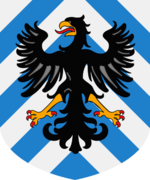Difference between revisions of "Socialist Unity Party (Tarper)"
m (grammar) |
m (added a table) |
||
| Line 72: | Line 72: | ||
*United Marxists (UMX), representing the Marxist minority in the party; | *United Marxists (UMX), representing the Marxist minority in the party; | ||
*New Socialists (NSoc), representing those who side with Chancellor Herzog's personal ideology. | *New Socialists (NSoc), representing those who side with Chancellor Herzog's personal ideology. | ||
| + | ==Bundestag election results== | ||
| + | {| class="wikitable sortable" style="text-align: center" | ||
| + | |- | ||
| + | ! Election | ||
| + | ! Seats won | ||
| + | ! ± | ||
| + | ! Position | ||
| + | ! Leader | ||
| + | |- | ||
| + | !2002 | ||
| + | | {{Composition bar|306|603|hex=#702963}} | ||
| + | | {{increase}} 306 | ||
| + | | 1st | ||
| + | | Tony Castilla | ||
| + | |- | ||
| + | !2005 | ||
| + | | {{Composition bar|222|614|hex=#702963}} | ||
| + | | {{Decrease}} 84 | ||
| + | | 1st | ||
| + | | Tony Castilla | ||
| + | |- | ||
| + | !2010 | ||
| + | | {{Composition bar|146|622|hex=#702963}} | ||
| + | | {{Decrease}} 76 | ||
| + | | 2nd | ||
| + | | Frederick Tapia | ||
| + | |- | ||
| + | !2015 | ||
| + | | {{Composition bar|254|630|hex=#702963}} | ||
| + | | {{increase}} 108 | ||
| + | | 1st | ||
| + | | Maximilian Herzog | ||
| + | |} | ||
==Leaders of the SU, 1999-present== | ==Leaders of the SU, 1999-present== | ||
{| class="wikitable" | {| class="wikitable" | ||
Revision as of 20:35, 19 August 2017
| Socialist Unity Party | |
|---|---|
 | |
| Leader | Maximilian Herzog (Chancellor) |
| Chairperson | Zoë Belcher |
| General Secretary | Noel Sniders |
| Founder | Tony Castilla |
| Slogan | "Forwards" |
| Founded | 16 August 1999 |
| Preceded by | Republican Union of Anti Capitalists (RUAC) |
| Youth wing | United Socialist Youths |
| Membership (December 2015) |
|
| Ideology |
Democratic Socialism Technocracy State Capitalism Eco-Socialism |
| Political position | Left-wing |
| International affiliation | none |
| Colors | Red-Violet |
| Bundesrat |
29 / 100 |
| Bundestag |
254 / 630 |
| State Legislatures |
337 / 1,301 |
| Party flag | |
 | |
The Socialist Unity Party, abbreviated as SU, is a Democratic socialist political party in Tarper. It is one of the two catch-all parties in Tarperti politics. It was founded as an underground party in 1999 in the Republic of Tarper under the name "New Millennium Party". The party was made as a successor to the Republican Union of Anti Capitalists, RUAC, from the democratization period of the Republic of Tarper, although with a more specified base.
The leader of the SU, Maximilian Herzog, is the current Chancellor of Tarper. From its creation, the party was a member of the Socialist International, but after the organization's move from socialism to liberalism, it removed itself from the SI in 2017.
Contents
History
Immediately after being released from prison founder and former Chancellor Tony Castilla met up with his friend Brigadier General William Herzog. Both had been members of RUAC but the death of the party had resulted in many members being persecuted by the fascist government. Within days of Castilla's release, the two had created the party and they had managed to track down almost every former member of RUAC. The party remained underground and quickly got popular within the southern territory of the Republic.
In early 2000 the Governments of Plamyadia, Sanghelios, and Comico had approached the party with a plan to create an uprising against the fascist government. In November the party led the first attack on the port of the city of Citrone thus starting the Second Tarperti Civil War. The party had become the sole ruler of its own faction, the Southern Six Union, and had gained more members. With the end of the Civil War, the party relinquished power from the Southern Six Union in order to create modern Tarper. The first elections were held on the first of September of 2002, the New Millennium Party had won.
Castilla Era & Renaming (2002-2010)
With the election of Tony Castilla as the first Chancellor of Tarper came a feeling of stability and safety. This overall feeling brought political participation to an all-time high and the first opposition party. Within the year of 2002, a niche remnant of the Republican Green Party that was hiding within the NMP had split and created the modern Green Party of Tarper.With no real opposition for the first term of Castilla's government, the party managed to pass much of its planned legislation. The 1st Parliament managed to create the foundation for modern Tarper, nationalizing and socializing various industries and services. The Parliament managed to gain large amounts of criticism, which managed to change the tide for the 2005 election.
In early 2004 a large chunk of the party broke off and joined with another breakaway faction from the communist party. These two factions joined together and created the Labour Party. The formation of the Labour party was a huge blow to the dominance of the SU. The SU managed to lose its majority in the Bundestag but not the Bundesrat and so Castilla remained Chancellor. When asked about the current events he said, "I am not mad, instead, I'm happy. It goes to show that the war was not in vain and that we managed to secure a true democracy here in Tarper.". Though in the end of Castilla's second term he called Parliament into the Imperial Palace for a constitutional convention. In the 2009 Constitutional Convention, the Parliament amended the constitution to include term limits for the Chancellor and President. Many in the opposition parties suspected that this was done in order to take away power from future opposition governments.
Tapia Era (2010-2015)
After Castilla's retirement from politics, the party was tasked with finding a new leader. In early 2010 the members of the party elected Frederick Tapia. Tapia was elected due to him being related to the Herzog-Tapia family. His connections and general competence had won over his compatriots and was inaugurated in March of 2010. The party went on to lose the federal election and had to lead the opposition from 2010-2015. The party's new task was being the opposition and it was handled fairly well. Though not much was done by Tapia he is renown for allowing the son of William Herzog, first president of Tarper, into the high ranks of the party. Though at the time, 2012, the government criticized that this was nepotism it is now regarded as one of the strategic moves that led to a resurgence in the party.
Herzog Era (2015-present)
After a large amount of airtime then GenSec of the SU, Maximilian Herzog, was becoming an icon of Tarperti politics. The sudden rise in popularity caused a significant disturbance in the state legislatures. When it came to the meeting of the Bundesrat the SU had achieved plurality and the former SU leader, Frederick Tapia, was chosen by the Bundesrat to become president. After this success, Herzog was chosen as leader of the SU.
When it came time for the 2015 Federal Election the SU ran an aggressive campaign. But the party did not achieve the 316 seats needed for a majority. Though the party did have plurality and so it won the office of Chancellor. But the Bundestag had ended up in a hung parliament and so the new Chancellor had to make a harrowing decision, whether to coalition with the Labour party or retain their rivalry with them. In the end, the two parties had come to an agreement for a coalition. So far this government has been regarded as the most effective.
Voter base
The party is particularly popular in the southern states but it has been losing seats to the Labour party. The party has maintained its popularity with a large range of socialists from Marxists to Democratic Socialists.
Party platform
The SU applying the principles of Democratic socialism and emphasizing the "principles of social ownership of the means of production". The SU's policies derive from Democratic socialism, social liberalism, as well as the execution of communist policies given by the former CTCR.
As a socialist party, the SU supports looser punishments of crimes and supports neutrality in foreign conflicts unless force is needed. In terms of immigrants, the SU supports initiatives to integrate immigrants through free government provided language courses, and aims to further remove immigration control. The SU emphasizes the preservation of cultural traditions.
In terms of foreign policy, the SU commits itself to Covenant integration and strong relations with Plamyadia.
Opponents of the SU are the Labour Party (though both are now in a government coalition), The Social Democratic Party of Tarper (SDPT) and the Communist Party of Tarper (CPT). The SU has however governed in one federal-level and numerous state-level Grand Coalitions with Labour as well as in-state and local-level coalitions with the Greens. The SU rejects coalitions with either anarchist, liberal, right, or far-right parties.
Very recently the Labour Party, a harder socialist party, is the preferred partner of any SU government since the SU and Labour have similar attitudes towards fiscal policy and Covenant integration along with recent and historical ties.
Internal structure
Membership
In May 2012, the SU had 484,397 members. The number has dropped by 3.1% in 2011 and 3.0% in 2010. The members' average age was 35 years. 6% of the Christian Democrats were under 15 years old. A 2007 study by the Herzog-Tapia Theorist Bureau showed that 45% of members were female and 55% male. Female participation was higher in the former Southern Six states with 29.2% compared to 24.8% in the former National Confederation states.
Herzog-Tapia Theorist Bureau
The Herzog-Tapia Theorist Bureau is the think-tank of the SU. It is named after the powerful political family of Tarper. The foundation offers political education, conducts scientific fact-finding research for political projects, researches the history of socialism, and supports and encourages Covenant unification, international understanding, and development-policy cooperation. Its annual budget amounts to around 120 million Krups.
Symbols
The party has many symbols from its motto "Forwards", which comes from the party's dedication to social progress. The flag of the party comes from the combination of its predecessors' colors; the orange being the RUAC, purple being itself, and yellow being the USDP of the TSE. The party uses ¡Venceremos! as its anthem. The song is said to emphasize the party's socialist mission.
Special organizations
Notable sub-organizations of the SU are:
- United Socialist Youths (USY), the common youth and student organization of the SU;
- United Marxists (UMX), representing the Marxist minority in the party;
- New Socialists (NSoc), representing those who side with Chancellor Herzog's personal ideology.
Bundestag election results
| Election | Seats won | ± | Position | Leader |
|---|---|---|---|---|
| 2002 | 306 / 603 |
|
1st | Tony Castilla |
| 2005 | 222 / 614 |
|
1st | Tony Castilla |
| 2010 | 146 / 622 |
|
2nd | Frederick Tapia |
| 2015 | 254 / 630 |
|
1st | Maximilian Herzog |
Leaders of the SU, 1999-present
| Leader | Period |
|---|---|
| Tony Castilla | 1999–2010 |
| Frederick Tapia | 2010–2015 |
| Maximilian Herzog | 2015–present |
Tarperti Chancellors from the SU
| Chancellor of Tarper | Time in office |
|---|---|
| Tony Castilla | 2002–2010 |
| Maximilian Herzog | 2015–present |
Tarperti Presidents from the SU
| President of Tarper | Time in office |
|---|---|
| William Herzog | 2002–2010 |
| Frederick Tapia | 2015–present |
| ||||||||||||||||||||||||||||||||||||||||||

